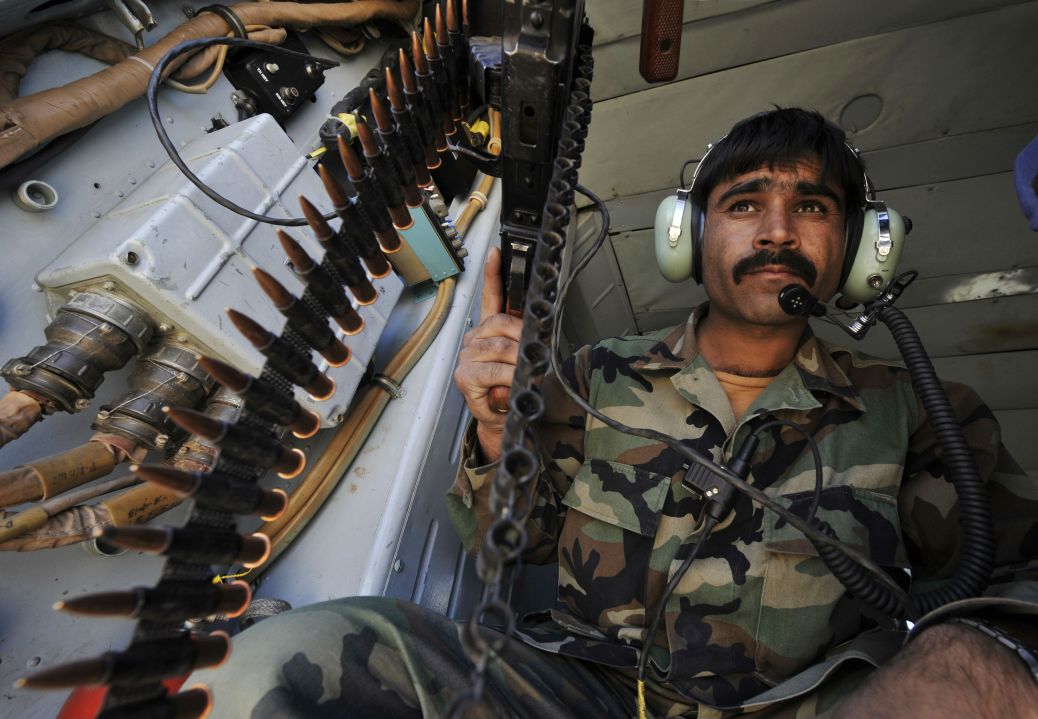Britain has ended combat operations in Afghanistan. The war did topple the Taleban, but it hasn’t got rid of them. It has improved some things in Afghanistan – better roads, better education, better newspapers – but the country is still corrupt, bankrupt and dangerous.
When Britain and America decided to go into Afghanistan in 2001, The Spectator ran an editorial entitled Why We Must Win.
This is not a war against Islam, but against terrorists who espouse a virulent strain of that religion, a fundamentalism that most moderate Arabs themselves regard as a menace. This is not even a war against Afghanistan, but an attempt to topple a vile regime. The Taleban deserve to be expelled simply by virtue of their inhuman behaviour towards women and dissenters. But that is not why we are bombing Kabul. We are bombing because the Taleban have repeatedly and publicly refused to hand over a man, and his accomplices, responsible for the biggest terrorist massacre since the war. The objectives of the bombing can in fact be articulated quite simply. They are to change the politics of Afghanistan, so that it can no longer provide sanctuary for the al-Qa’eda network. No one has ever suggested that this will be the end of international terror, or bin Ladenism. But it is a start. We may not be able to accomplish everything in this war. We may be sweeping under only one corner of the carpet concealing the creepycrawlies of this planet. That does not mean we should not begin.
Morally and intellectually, there is no difficulty justifying Western action in Afghanistan. There is, however, only one thing finally that justifies a war in the imagination of the public and the media, and that is victory. It is becoming ever more apparent that there is only one way to achieve our ends — kick out the Taleban; rid Afghanistan of al-Qa’eda — and that is to use ground forces. This will require huge courage. It will not be easy. But there is no other way out of Afghanistan. Victory is the only exit.
Less than a year later, the Taleban were no longer in control of the country, but Caroline Moorehead was already worrying about our staying power in Afghanistan.
The American victory over the Taleban and the subsequent arrival of peace-keepers and aid-workers have done little to heal Afghanistan’s wounds. After more than 20 years of war — first against the Soviets, then among themselves — Afghans remain a destitute people. Kabul itself is three quarters destroyed, and sewage runs along open gutters. The handful of tarmac roads that link the larger cities — Afghanistan is the size of Texas — are all but impassable, as a result of neglect, erosion and the effects of war. The water supply, once the pride of Afghanistan, flowing in underground canals and irrigating wheat fields, orchards and vineyards, has collapsed under mines and shelling. The towns have only sporadic electricity. There is no postal system and no telephone. Ariana, the state airline, has been left with two aeroplanes. There are calculated to be up to ten million unexploded landmines — down wells, in fields, among the ruined houses. Afghanistan was once self-sufficient; it is unlikely ever to be so again.
What will happen when President Bush decides to give up the search for Osama bin Laden and take his war on terrorism elsewhere? Then the great aid caravan, with its walkie-talkies, landcruisers and armed guards, will drift away to newer, more imperative, more newsworthy emergencies. Eight million people could be short of food by winter. ‘It is not a question of whether or when we abandon Afghanistan,’ said one UN expert, veteran of many similar emergencies. ‘In a way you could say we’ve abandoned it already.’
But David Miliband, when he was foreign secretary, wrote a piece for this magazine explaining why Britain would not abandon Afghanistan.
Our direct interests are at stake in tackling the terrorist threat. But so is our word. At Bonn, in December 2001, and again in London, in January 2006, the world made a pledge to the long-suffering people of Afghanistan: after nearly 30 years of unparalleled suffering at the hands of the Soviet Union, the warlords, and then the Taleban, we would help them all — women as well as men — to set up a state of their own, free from oppression.
To serve our interests and those of ordinary Afghans the social, economic and political changes require stability. We must help Afghans squeeze out of their country, both physically and morally, those elements whose malign purpose is to deny Afghanistan the future it deserves. The Taleban, above all, whose objective — the imposition of a mediaeval emirate in the name of Islam across as much of Afghanistan as they could conquer — would consign millions of Afghan men and especially women to miseries they remember only too well. Taleban success would produce an opposite reaction from the North, bringing back the dark days of civil war. If we allow Afghanistan to become a failed state, it will always be a target for terrorist activity. If we can support the Afghan government in establishing stability and the rule of law, it can become a target for development.
These days the Taleban in Afghanistan are getting stronger by the week and attempting to take back Helmand. The Afghan security forces are shaky at best. The threat from terrorism is now more concentrated in Syria and Iraq than in Afghanistan, though some warlords there have mentioned more than a passing interest in fighting with Islamic State.







Comments